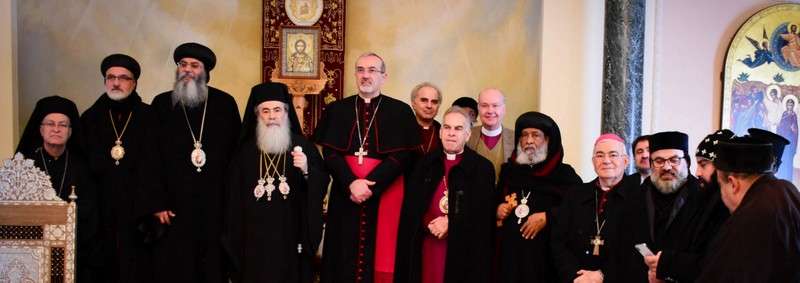
An ecumenical witness: patriarchs and church leaders in Jerusalem
by Riccardo Burigana
Often, especially upon returning from a pilgrimage to the Holy Land, one gets the impression that the ecumenical journey, which has given Christians so many and so many fruits, sometimes not always all known and shared, is struggling to establish itself there where Jesus lived and the Christian experience was born. This impression, often corroborated by personal encounters in some places of worship, is reinforced by the images of clashes between Christians that certain media and social media bounce around the world to feed the idea that Christians cannot overcome the time of confrontations and divisions.
These impressions do not take into account the many and many daily experiences of dialogue and sharing, which see Christians as protagonists, even in the Holy Land, where they often go beyond the perspective of the ecumenical path, so much so that the dialogue between Christians takes on an interreligious dimension, creating bridges between Christians, Jews and Muslims. Among the ecumenical experiences, which have been multiplying in recent years, in the face of the radicalization of political confrontation, one has taken on a prophetic value of great importance not only for the region: the Council of Patriarchs and Heads of Churches in Jerusalem.
The Council has a history of a few decades behind it, since the first experiences in this regard, after there had been meetings on a personal level for centuries, in a context that nurtured official distinctions, especially during the 20th century, dates back to the mid-1990s, when in the climate of the approach of the Great Jubilee for the Catholic Church and the ever-living interest in the search for peace in the region a practice of regular meetings, still in a form that was not entirely official, of the leaders of the different Christian communities present in the Holy Land began. Over the years, especially in the last decade, for a variety of reasons, including the new season of ecumenical dialogue at the universal level that opened with the election of Pope Francis, the shared interventions of the Patriarchs and Heads of the Christian Churches in the Holy Land, who have become an actor in the political-religious dynamics of the region, have multiplied. Alongside the messages signed on the occasion of certain liturgical moments, such as Christmas and Easter, in which the call to prayer, albeit in the different places of worship, was meant to be a tangible sign of the desire to strengthen the ecumenical journey, showing the way to live unity in diversity, sustained by sharing the joys and hopes of Christians in the Holy Land, there was no shortage of calls for concrete, daily efforts to end the war so that we can truly promote a path of peacemaking and peace that would not only allow Christians to remain in the Holy Land, but help men and women discover the possibility of living together in the harmony of religions.
Several times the Council, which gathers almost all the Christian Churches in the Holy Land, from the Catholic Church, to the Lutheran Church, to the Orthodox Church, in its different articulations, to the Ancient Oriental Churches, has expressed its deep concern about the policy of unilateral annexations announced by the State of Israel, calling for a commitment by all, including at the international level, to make listening to the other prevail as the rule for getting out of the climate of violence which, for the Patriarchs and leaders of the Christian Churches in the Holy Land, leads to nothing but more violence. The call for prayer in Almighty God, addressed to all, to find the necessary calm with which to assess the reality of the situation, putting an end to the game of hurling accusations at each other, taking the path to ensure a just, long-term peace "in that part of the world considered Holy by the three Abrahamic faiths."
The words and gestures of the Council of Patriarchs and the Heads of the Christian Churches of the Holy Land have nurtured a culture of dialogue, even through unthinkable steps, such as sharing the project for a progressive restoration of the Basilica of the Holy Sepulcher, while respecting their own identity, showing how the ecumenical journey is not about multiplying bodies and institutions, but about finding forms with which to express a communion with which to witness together to Christ, Savior of the Gentiles, so as to be ever more effective and credible peacemakers who are God's gift to the world.
